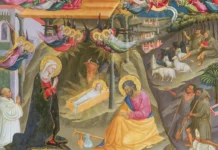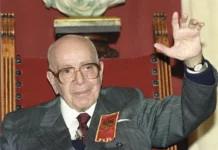Speaking about the important role of tendencies and of ideas in the confrontation between the Revolution and Counter-Revolution, Dr. Plinio analyses the power of Public Opinion and the influence exercised in society by those he calls key men.
It is possible to establish a real doctrine regarding the power of Public Opinion. To begin with, we might ask ourselves what it would have consisted of in Paradise, before the sin of Adam and Eve. If they had not fallen, and if their descendants had continued to live in Eden, would there have been Public Opinion? What would be its importance and dynamism?
To answer these questions, some observations are required.
The highest degree of truth that can be attained…
As a starting point we must bear in mind that in Terrestrial Paradise man was not subject to error. From which, at first sight, it follows that all opinions would be equal. And this because, if they were not, one would necessarily have to be wrong. Therefore, it was imperative to have an absolute uniformity of thought.

However, a deeper analysis shows us that this conception is erroneous. Since each man discerns in reality some aspect more fully than others do, without it being necessary to say that the other is wrong, it may be affirmed that each man is more especially endowed to see a certain characteristic of creation.
Three or four artists who, before the work of a great painter, begin to make comments, each one with his own peculiar artistic sensibility, sees in the canvas a set of aspects that the others do not see and experiences what the others do not experience, although they are considering the same picture.
Therefore, in a conversation that took place before original sin, there would be no debate, since no one would be in error, but each one would give his opinion to complete the other’s thought. Public Opinion on a given matter would therefore be the totality of everyone’s impressions on that question. In other words, it would be the maximum degree of truth that human beings could attain regarding a certain matter.
It is quite evident that Public Opinion conceived in this way would constitute an extraordinary authority for men, an immense natural power, and an equally great source of satisfaction. According to this order of things, society ought to have allowed itself to be enlightened and guided by it, for human beings, in their very essence, were made to think and act in accordance with a Public Opinion.
… a general consensus, subject to error
With original sin, men became susceptible to error, although they continued to have the tendency to allow themselves to be governed by Public Opinion. The latter, in turn, also became subject to error, so that man’s situation became distressing: on the one hand, he continued to have a strong desire to agree with Public Opinion; on the other, he felt obliged to exercise control over it.
To disagree with Public Opinion is one of the most unpleasant stances to which man has to subject himself. Let us take a circle of young men in which each one is boasting of the immoralities he has practised. At a certain point, one of them is asked: “And you, what did you do last night?”
If the young man replies that he slept, there is a sort of general disappointment: “This good-for-nothing slept. He’s a fool!” And the young man, who was the only upright one in that circle, and who could quite rightly call the others scoundrels, does not have the courage to do so. He remains silent, because the pressure of Public Opinion is tremendous.
Situations like this are difficult to face, given that what others think of us takes on disproportionate importance. It becomes difficult to break with the general consensus, because we are powerfully influenced by the opinions and conduct of others.
Social contagiousness in tendencies and ideas
From this we can draw a concept that we might call the principle of social contagiousness.
Let us imagine, by way of example, that we lived with Cardinal Merry del Val, Secretary of State of St. Pius X, who died in the odour of sanctity. Without doubt, the presence of the illustrious and virtuous Cardinal would have a great effect on the whole house in which we lived. At dinner time, he would be at the head of the table and we would instinctively turn off the radio which was broadcasting the latest news. He would begin to speak. And evidently no one would have the courage to ask him questions such as this: “Your Eminence, have you heard the latest joke about the Portuguese and the Turk?”
He would not even comprehend something on that level! He would give such an icy, formal smile that one would immediately understand one’s mistake and elevate the tone of the conversation. This contagion of dignity that would be produced by the mere presence of Cardinal Merry del Val could be called a contagion on the level of the tendencies.

Another example, along the same lines, are military parades. Why are parades held to stimulate patriotism? On the face of it, a speech might seem more effective. But in in reality, this is not so. The rolling tanks, the cavalry with their bugles and the legions of infantrymen beating their drums, all of this is extremely captivating. When the cannons roar and the playing of the national anthem begins, everyone is thrilled. The contagion comes from the mere fact of contemplating the army on parade, just as it would be from seeing a friar walking or a procession in progress. These are impressions that last only a few moments, but that profoundly mark the soul.
There is also contagion on the level of ideas. If we read a certain argument in a book, we end up memorizing it as if it were a subject learned in a classroom. However, if a colleague who has a degree of influence over us were to support that same argument, it would seem to take on life and we would begin to find it interesting. It would become as different from the argument read in the book as a butterfly in flight is from the dead one on display the Natural History museum. It would acquire a new vitality and capacity for penetration. This is contagiousness.
Influence among people and ambiences
We can conclude that no event in social life that is exempt from a Public Opinion effect on the level of Revolution and Counter-Revolution. Two people who converse, if they are not careful, will mutually influence one other. It is impossible for two men to meet without exerting some influence upon each other, however slight.
As a corollary to the previous statement, we can say that a man placed in a certain environment must either exercise a constant reaction of not letting himself be influenced, or, even against his will, he will allow himself to be contaminated by it. The reciprocal is also true: the ambience will sustain, from his part, a certain contagion.
Let us take the radio as an example. Who would have imagined, before the invention of this device, that the waves emitted by the BBC tower in London would reach us, and that it would be possible to hear them just by pressing a button? Well, that is an image of what happens in the world of souls. Every soul, however obscure and modest it may be, is, in greater or lesser proportions, a sort of BBC tower, with longer or shorter waves, but capable of overcoming long distances. The question is to be able to detect them.
The principle of key men
This idea leads us to another principle: that of key men.
There are some men in society whose role it is to radiate something in a particularly intense way. This is true of three categories of persons: those who exercise this function by divine vocation; those who exercise it by their state in life; and those who exercise it by reason of personal capacity.

Among the first, let us take as an example St. Francis of Assisi. The chronicles relate a fact from his life which, in the realm of tendencies, is truly marvellous.
On one occasion St. Francis invited one of his friars, Brother Leo, to join him as he preached to the people. They left the monastery, walked through several streets of the city and returned. On their return Friar Leo, somewhat confused, asked the Saint what was the sermon they had preached, to which he replied, “Walking through the streets was the sermon that we preached.”
This is precisely the application of the principle stated above. To see someone like St. Francis, so poor, so humble, so recollected, so gentle, so profound, so convinced of his vocation, so elevated, so supernatural, is equivalent to hearing a sermon.

Another example of a key man by divine vocation is St. John Mary Vianney. He was not very intelligent and of modest personality. However, just by seeing him preach from the pulpit, from afar, even without being able to hear him, many were converted. The Curé of Ars belonged to that category of men to whom God had given the mission of making the supernatural translucent in some way, so that being near them people felt what the Apostles experienced on Tabor with Our Lord Jesus Christ.
An example of a key man by his state in life
Alongside those who have this mission by divine vocation, there are others who possess it by their state in life. Men of high social rank, for example, should be emblematic persons, capable of radiating certain truths that preserve the integrity and order of the society in which they live.

We can cite the famous case of Grand Duke Nicholas Nikolaevich during the communist revolution. He was a very tall man with a broad face, a long nose and the characteristic feature of a white goatee. He was a herculean and robust Slav, appearing to have emerged from the woods, but well-groomed and disciplined.
The Bolshevik revolution erupted in his time. The phantasmatic, weak and lukewarm Nicholas II abdicated. Revolutionary waves were unleashed throughout St. Petersburg; agitators ran around shouting slogans and brandishing the red flag, and workers looted the shops they came across. The Grand Duke Nikolaevich, upon hearing of this situation, decided to leave his palace to go to the Tsar and pledge his solidarity. He donned his uniform replete with decorations, entered a large limousine with his adjutant and set off. The inevitable happened. At a certain point, the revolutionaries stopped the vehicle and began to smash the windows, attempting to kill the Grand Duke. He arose and, from the full height of his stature, glaring at the people, gave them a severe tongue-lashing and ordered them to disperse. They all stepped back and the car arrived at the imperial palace!
The Grand Duke was a man whose duty of state was to reflect the royal majesty, and he knew how to do so. As a military man, he had to maintain discipline, and he symbolized it well enough to single-handedly disperse an angry mob.
In this sense, it must be said that every man should outwardly reflect his function in society. What the French call le physique du rôle – to have an appearance in keeping with the role one plays – is something that is demanded of every person. A magistrate cannot have a clownish air; if he does, he is betraying his mission. Besides having an in-depth knowledge of the laws, he must be a man imbued with the dignity of his office. The profile of a dandy does not befit a military man. The priest cannot have the semblance of a layman; and there is nothing worse than a layman who has the air of a priest. Each social role has its proper persona, and there is a persona for each role.
Key man by personal capacity
Finally, there are individuals who manifest this gift of radiating by personal capacity. Often, just by their silence, their gaze, a few words, and by their mere presence, such men generate a whole series of states of mind. Others have the same quality in the field of logic or reasoning: they argue so well that the adversary is crushed by their reasoning.
They are people to whom God has given the task of guiding others towards the good, within the natural order itself. And if someone has this capacity, he is obliged to exercise it. ◊
Taken, with slight adaptations,
from: Dr. Plinio. São Paulo. Year II.
No.13 (April, 1999); p.11-14








No porque los hombres no estuvieran sujetos a cometer errores se sigue necesariamente que todas las opiniones serian iguales. Puede haber distintas opiniones correctas.